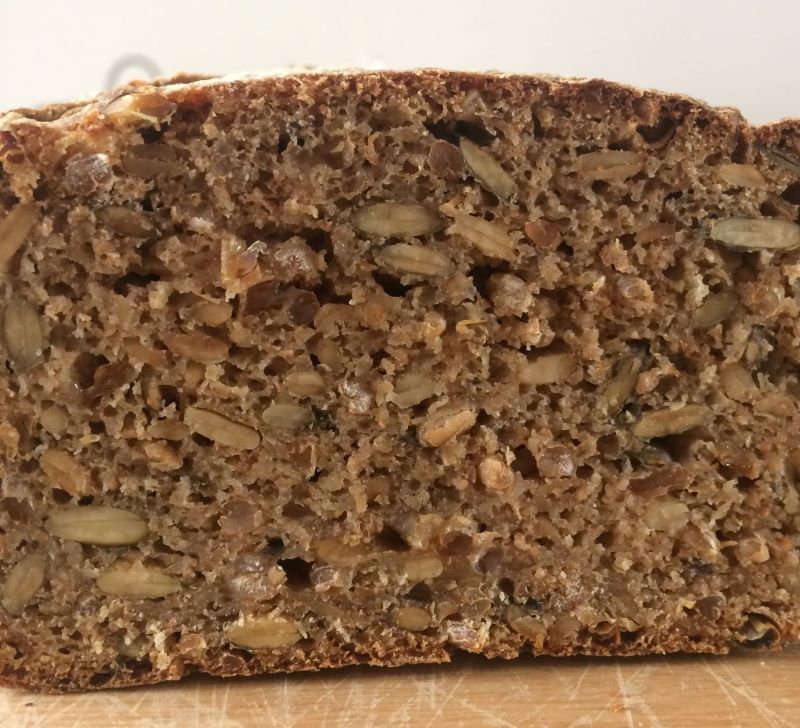an ongoing problem.
Im trying to devise a recipe...im nearly there.
its:
140g rye sourdough
200g sprouted rye hydrated berries
135g pumpkin/sunflower seeds
60g yoghurt
130g water
15g honey
leave for 12 hours
after 12+ hours add:
200g wholegrain rye flour
70g wholegrain spelt flour
12.5g salt
100g water
mix and spoon into pan and leave to proof for up to 7 hours
bake.
it tastes delicious but unlike other rye breads ive made i can never tell when its proofed (i have yet to see a bubble or a crack on top even with a sprinkling of flour on top) even after 7 hours which seems a long time to me.
After 7 hours (and no proofing signs) I stuck the bread into oven and what i got was a barely risen loaf with a dense wet bottom.
It baked for 75 minutes @ 200C and had an internal temperature of 210F.
Where am i going wrong?
originally i used 135g cracked rye berries instead of sprouted but i prefer sprouted and they have a better mouth feel and i added 200g hydrated sprouted berries as an approximation of 135g dry berries...that could have been a mistake? Having said that i reduced the overall hydration because i was using presoaked berries and i made sure the final mix was drier than i wanted

Hi!
There are quite a few questions I would have for you with regard to why your recipe isn't showing signs of proofing.
1. At what stage are you using your starter? A just fed starter, right from the fridge, or active and bubbly a few hours after a feed?
2. Why are you letting the starter sit with the cracked berries before mixing with flour? What is the intention of this stage?
3. What temperature are you letting it rise at? A cool 60-something room temperature, or more like mid-70's?
My thoughts are perhaps the starter is mostly after that 12 hour soak with the berries. Or, the temperature isn't high enough for this rise time. Also, this is a lot of hydration and a lot of heavy ingredients with little gluten formation, so the rise isn't going to be great in any case.
What are you aiming for with the bread? Is there a recipe you're trying to emulate?
I’m doing a play on a classic rugbrod which is basically everything into the bowl for a long fermentation then add flour, leave sit a while and then put in pan and proof see http://www.kvalifood.com/page/danish-sour-dough-rye-bread-my-favourite-recipe/uuid/ad73549b-4f7c-11e6-8f55-e9ebade15876
your right with the heavy ingredients but the problem is how to know it’s proofed. I use a microwave as a proofer and I make another high hydration rye sourdough which shows proofing signs although it doesn’t have the same weight of soakers in it....oh and I start with a refreshed active rye starter
Ahh. Ok. I haven't played around much with rugbrod, so the formula/process is interesting, but unfamiliar to me.
But, you should probably still see at least some sort of bubble forming (or air holes from where the gasses have escaped).
I made a rugbrod once and it was a heavy, dense, hearty bread. I don't know the answers to your problem, but maybe comparing this recipe will help.
https://www.daringgourmet.com/easy-danish-rye-bread-rugbrod/
Maybe there’s the answer- put it all in leave it to ferment, into pan and bake. Forget about proofing because essentially it’s done all it can do. Ha. Thank must look into this more
bottom. The crust could be a little browner in my opinion but it looks like it should considering the wide pan and ingredients.
Thanks mini my biggest issue is the lack of proofing signs - I’m baking with an educated guess and am at a loss as to why there are no signs...am currently doing same bread again but this time adding some of the flour and more water to sponge and then doing final mix with rest of flour, salt and, if needs be, water
intuitively. Dough aroma, texture of the dough when moved or shaped, slight lightness in color, not yet pinholing but close to it. Those signs?
You said
Im trying to devise a recipe...im nearly there.
You're nearly where? Since you're not copying any other recipe, you shouldn't expect yours to behave the same as other recipes do. But if you want it to turn out more like something you remember, then find out how they did it - whoever "they" are. ?
Copying successful old bread recipes is usually better than inventing new ones, unless you want to make something "different" "weird" etc. After thousands of years of bread making, most things have already been tried at least once. ? (And most of the successes have been written down.)
I’m riffing off another recipe but trying to sort out proof as signs seem absent - I’m with you in standing on the shoulders of the past, if only not to forget ?